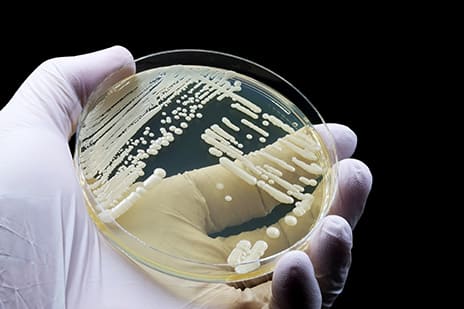Problems when preparing culture media
4 de November de 2023It is important to avoid the most common issues when preparing culture media: deviation from the expected pH, melting agars with microwaves, results interpretation, unexpected quantitative results or the receipt of prepared plates.

Variations in pH
There are a number of reasons that can influence the pH. One is “overheating”.
Inadequate or unsuitable water may be another reason. Also, pH-determination may have been done incorrectly. Lastly, a contamination from the container itself may have contributed to the changing pH.
Overheating may be due to:
- Excess sterilization.
- Heterogeneous mixing.
- Repeated re-melting.
- Improper storage.
Ensure that the heating time and temperature are not exceeded and operate under ambient conditions.
Unsuitable water. With regard to the water, the following should be considered:
- The purified water used should show a conductivity of less than 15 µS and a pH of between 5.5 and 7.7.
- When de-ionisers are being regenerated with acids and alkalis , residue of the HCl present in the purified water may cause the pH of the medium to lower
- Water, when not fresh, may have absorbed CO2 from the atmosphere.
pH determination:
The composition of culture media is adjusted to provide the correct pH after reconstitution and sterilization. Should the medium be supplemented, the pH limits apply to the complete medium. Any adjustment of pH should not be done prior to autoclaving.
Obtaining a different pH reading may be due to:
- pH measurement performed outside the temperature specifications (10°-37°C). In such instances, allow the medium to cool, and re-check within the temperature specifications.
- Incorrect electrode used.
- The culture media is too hot.
- Agar products, at ambient temperature, will be in solid form and require the use of a flat bottomed pH probe, in order to facilitate measurement. The use of temperature compensation is not recommended. We suggest a combined electrode with the following specifications:
- pH range: 2.0 to 11.0.
- Working temperature range: 0.0 to 80°C.
- Reference electrolyte: polymerized and without AgCl.
- Diaphragm: open.
- Expected life: 4 to 6 months, depending on the use.
- Broths are liquid and we recommend pH probes that are resistant to proteins and provide fast readings, such as those with a triple ceramic diaphragm and a wider sensitive membrane surface area having the following specifications:
- pH range: 0.1 to 12.0.
- Working temperature range: 0.0 to 100°C.
- Reference system: crystals of Ag / AgCl encapsulated, CRISOLYT-G electrolyte.
- Diaphragm: 3 types of ceramics.
- Expected life: 1 year or more when used correctly.
- The electrode used is not properly calibrated. Re-calibrate the pH meter with Scharlau pH buffer solutions.
- We do not recommend the use of temperature compensation.
Contamination:
Make sure that the glassware is of a suitable quality for the preparation of culture media and avoid using soda glass.
Rinse glassware before use, to achieve neutrality.
Melting agars with microwaves
There is nothing stipulated by any directive, however Scharlab usually recommend the following steps whenever bottles having the correct metal cap are used.
Note that while metallic components cannot be placed in a microwave, Scharlab has developed an exclusive metallic cap that enables the re-melting step to be carried out in a microwave. This process improves the time spent in analytical laboratories.
The following procedure is recommended:
- Place the flask in a beaker with water to ensure uniform temperature distribution.
- Place inside the microwave.
- Following the application of heat observe and gently stir to facilitate complete dissolution of the agar.
- If the agar is not completed melted put the beaker containing the flask in the microwave again, until a homogeneus appearance is observed.
- Pour the agar plates using the standard technique.
Results interpretation
Check the Certificate of Analysis (COA) provided for each batch of media. These details can be found in our website, under ‘Support Menu’, ‘Technical Information’. From this information you will see the control strains that have been used to carry out the performance tests. A picture of the growth of several test strains will also be found on the CoA.
Unexpected quantitative results
We might find:
- Repeated melting-overheating.
- Inadequate or improper mixing.
- The inoculum itself: the addition of inhibitors or excessive electrolytes during inoculation.
Please also check the expiry date on the bottle and the general appearance of the medium in dry form. Humidity may degrade peptones contained in the formula. Contact with air may have oxidized any of the supplements. Exposure to sunlight may have altered the colour of the medium. Ensure that each bottle is properly closed after each use and stored in a dry place away from direct sunlight.
Receipt of prepared plates
Plates are products which are very sensitive to sudden changes in temperature. Once outside our facilities, it is complicated to be able to control all the factors that can lead to product alterations. These products are manufactured in non-sterile, ISO 7 clean rooms. Scharlab has optimized its processes and has managed to work with an AQL <0.5%.
All our shipments of culture media prepared within Spain are made in trucks that record the low temperature to which the transported product is subjected. This record of temperatures can be consulted through the link provided in the automatic mail of departure notice of the merchandise. If you have a problem with the product, this document can be useful to investigate the cause.
In general, upon receipt of these products at your facilities, we recommend following the storage instructions indicated in the same box or in the technical documentation of the product. In case the storage conditions are in a refrigerator or cold room (2-14ºC), it is important to remember that the product must not touch the walls of the equipment, to avoid freezing.
For further information or to enquire about other products or services, please write to helpdesk@scharlab.com.


